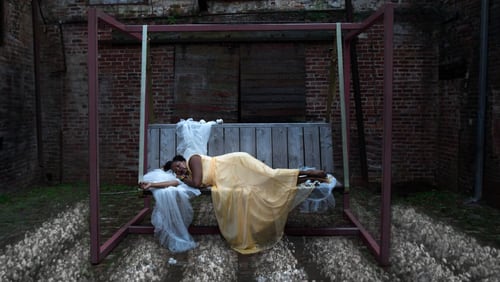Editor’s Note: This story is one in a series of Black History Month stories that explores the role of resistance to oppression in the Black community.
For Tricia Hersey, rest saved her life.
Back in 2013, she was in the throes of a grueling theology master’s program at Emory University, while raising a young son.
With six classes and 3,000 pages to read per week, a competitive internship and a commute to school that required three buses and a train, Hersey was in a constant state of exhaustion.
It didn’t help that she was also plagued by images of Black violence with the killings of Michael Brown, Eric Garner, Philando Castile and others. As a community organizer, she was often pulled to the front lines to fight against social injustices.
“The pace of life was so challenging,” she told The Atlanta Journal-Constitution. “I was tired and feeling like I was on the brink.”
Her solution? A nap.
The relief she felt after a few moments of stillness was so infectious that she began to nap more. Whether it was her bed, couch or the benches across campus, she intentionally made time to close her eyes daily.
“It was all experimental. I listened to my body. I started to rest and slow down, because I saw no other way,” the Chicago native said. “If I flunked out of school because I was resting, I didn’t care.”
But the opposite happened. Both her grades and energy soared. The more she rested, the better she felt.
Soon, Hersey started implementing her personal experimentation with rest into her studies of Black liberation theology, somatics and cultural trauma. In fact, to present her thesis work she organized a napping event, inviting people to a space to relax and hear soothing meditations.
“I knew that something special was happening the moment that I walked around and saw people sleeping and snoring. I saw people waking up crying,” she said.
Hersey wanted to do more to educate the masses about the liberating power of naps, so in 2016 she founded The Nap Ministry. Through performance art, napping events, immersive workshops and interactive lectures, Hersey, a.k.a. The Nap Bishop, has been using her organization to examine her theory of rest as resistance.
The organization recently acquired an event space, The Rest Temple, located in Atlanta’s Grant Park neighborhood. Last October, Hersey released her debut book and New York Times bestseller, “Rest Is Resistance: A Manifesto.”
The book has appeared on many reading lists, including Time’s “12 new books you should read in October” and Audible’s “12 best nonfiction listens of 2022.”
A review from Publisher’s Weekly said, “Hersey’s ministry background shines through in her passionate and eloquent arguments that read like a clear-eyed sermon ... the provocative message will appeal to those tired of grind culture.”
Hersey also spreads her messages through social media, although she admittedly despises it. (“Social media is trash,” she said.) The Nap Ministry has more than 600,000 followers across Instagram and Twitter. Some posts are powerful, thought provoking notes about the ills of grind culture, while others are more terse like the one that simply reads, “Lay yo (butt) down.”
But Hersey doesn’t want her work to be interpreted as a social media, wellness or religious campaign. She describes it as a political and social justice movement to upend capitalism and white supremacy.
Hersey believes capitalism and white supremacy disregard humanness, because both encourage people to overwork and overproduce at a machine-level space even when exhausted. To push back against these two “violent” systems, she said people must prioritize rest and not tie their worth to how much they can get done.
Hersey, who holds a bachelor’s degree in public health, was a student of this type of resistance before phrases like “soft life” and “quiet quitting” became trends. For years she’s researched the origins of American capitalism, which can be traced back to slavery. She read copious stories about the enslavement of Black people and the tiredness and trauma they experienced as a result of being forced into brutal labor.
Hersey saw her own family members struggling with exhaustion. Her father was a pastor, community activist and railroad worker. While he suffered from diabetes and heart disease, she attributes his early death at age 55 to overworking.
“Capitalism is trying to kill us,” she said. “It surprises me that people have been bamboozled for this long ... They see resting as some luxury that you have to earn. People actually believe you don’t need to sleep. You literally will die without it.”
Sleep deprivation does affect many adults, but Black Americans suffer from it more than other races. The Centers for Disease Control and Prevention found that nearly 44% of Black adults reported having short sleep duration, or less than 7 hours per night, compared with 31% of white adults.
Sleep deprivation won’t just make you groggy during the day. There are correlations between the condition and illnesses, such as heart disease, diabetes and high blood pressure, which all disproportionately affect Black people.
“When I think about how deep sleep deprivation is in this culture, I’m surprised that people are still standing,” she said. “That’s why this work is literally about saving people’s lives.”
With bills to pay, kids to raise and other obligations to meet, Hersey acknowledges that rest may seem elusive for some. But she wants people to reimagine what it can look like.
“It’s listening to music. It’s taking a bubble bath. It’s drinking tea. It’s not returning a phone call immediately. It’s the things that allow us to just be,” she said.
Hersey takes months-long breaks from social media. She daydreams frequently, staring out the window to watch the trees and birds. She embraces a slow paced response with her email inbox.
“I understand that grind culture will continue to rage on. I don’t think in my lifetime that capitalism and white supremacy will be dismantled,” she said. “But I’m grateful to be a part of a legacy of ancestors who said no and resisted. Rest hasn’t failed me yet.”
This year, the AJC’s Black History Month series focused on the role of resistance to forms of oppression in the Black community. In addition to the traditional stories that we do on African American pioneers, these pieces ran in our Living and A sections every day this month. You can also go to ajc.com/black-history-month for more subscriber exclusives on the African American people, places and organizations that have changed the world.
About the Author







